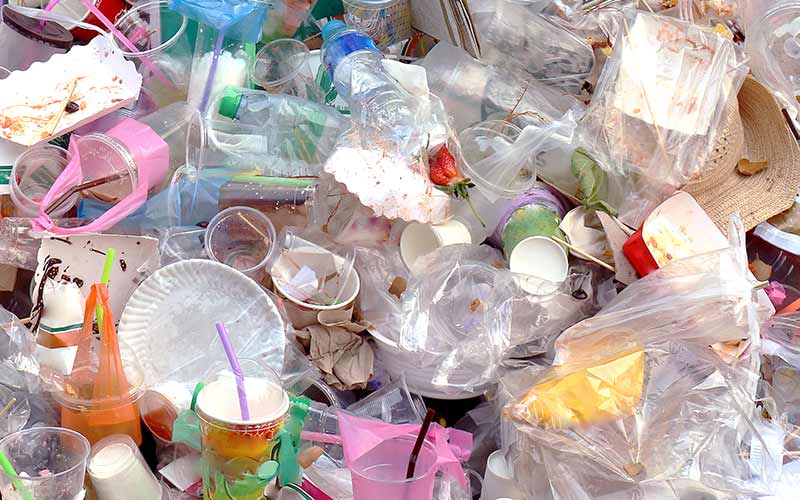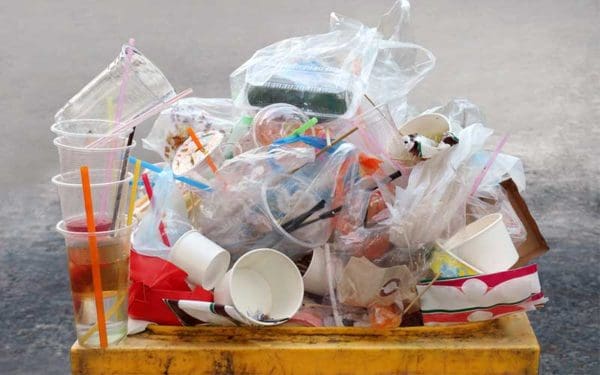
We need to kick our plastic habit for good, for the sake of our health, our environment, and our climate. Photo: DeawSS via Shutterstock
Earlier this year, CLF helped Vermont pass the strongest state law in the nation to reduce dangerous plastic pollution. Act 69 tackles four of the most common single-use plastics by banning plastic bags, stirrers, and toxic polystyrene food packaging and making plastic straws available only on request.
The new law also directs legislators and other stakeholders to work together this fall to develop even stronger measures to curb the use of toxic plastic products. The group, called the Single-Use Products Working Group, must submit a report by December 1, 2019, to the Vermont General Assembly that documents the public health and environmental impacts of plastic pollution and identifies additional action to address the plastic crisis.
Plastic is much more than a litter problem. It exposes us to harmful chemicals and contributes to the climate crisis. We must eliminate all single-use plastics – or risk more harm to our health, our environment, and our climate. As the Working Group meets over the coming months, CLF will be there at every step to push for the bold action and creative solutions we need to tackle our plastic crisis.
Big Oil and Big Chemical are Fueling our Plastics Crisis
As we work to curb carbon emissions from power plants, transportation, and other sectors, the fossil fuel and petrochemical industries are looking for ways to stay relevant and profitable for their private investors. That has them focused on expanding the production of plastic.
In the U.S. alone, the petrochemical industry has invested over $200 billion in 333 new projects and expansions since 2010, all of which are linked to fracked gas. Most of this capacity will be used to manufacture plastic. All told, these projects will pour millions of tons of climate-damaging emissions into the atmosphere.
If we don’t change course, plastic production (and the incinerators used to dispose of it) could emit 2.8 gigatons of carbon pollution every single year by 2050. That’s more than the emissions from 600 large coal-fired power plants combined. At a time when science tells us we must drastically cut emissions by 2030 or risk catastrophe, we must end our plastic habit, now.
Plastic is Poison
Plastic has become the go-to for food packaging over the last half-century. However, its use exposes us to toxic chemicals when they leach from the packaging into our food and drinks.
Styrene, for example, used to make polystyrene foam packaging, causes cancer. Brominated flame retardants, phthalates, and lead compounds are common plastic additives. These chemicals can trigger neurotoxic effects, adversely impact thyroid function, disrupt hormones, and cause birth defects and cancer. Other dangerous chemicals like per- and polyfluoroalkyl substances (PFAS) are also added to some types of food packaging (and the list of their harmful side effects is just as frightening).
We cannot continue to rely on toxic plastic that can do so much harm to our health and that of our children.
Recycling Alone Won’t Solve the Plastic Pollution Crisis
Despite each of our good intentions, most plastic never gets recycled. In fact, 6.3 out of the 6.9 billion tons of plastic generated since World War II have not been recycled. Instead, plastic makes its way into our oceans, rivers, and streams and poses a serious risk to wildlife after it is discarded. Too often, seabirds, sea turtles, seals, and other marine mammals are killed after ingesting or getting entangled in plastic.
In addition, plastics break down into microplastics, which are now ever-present in the environment and our drinking water. This poses a significant risk to humans and every other living organism.
Plastic sent to a landfill or waste incinerator presents its own set of public health challenges. While landfills may contain waste in the short term, inevitably they release toxics from plastic and other contaminants into the environment. Incinerators that burn plastic and other trash spew toxic air pollution while also generating dangerous ash that itself must be disposed of – all of which threaten the health of workers and nearby communities.
Increasing recycling rates remains critical, but that alone will never make plastic safe. Many plastics cannot be recycled due to their chemical make-up, are not economical to recycle, or contaminate valuable recyclables. In addition, China and other countries have stopped accepting most recyclables from the United States, including mixed plastic. This has exposed the real costs of plastic waste management.
What’s more, recycling still does not eliminate the serious lifecycle costs of plastic, which, as already noted, start with the fracked gas and chemicals involved in their manufacture.
Cheap Plastic Simply Costs Too Much
We use these dangerous plastics for just minutes – plastics that poison us, plastics that trash our waters and wildlife, and plastics that throw fuel on the climate crisis fire. It’s time to tell the plastics industry enough is enough and kick our plastic habit for good. The only way to solve this problem is to eliminate the use of single-use plastic products and hold corporations accountable for the public health and environmental impacts of their toxic plastic trash.
CLF is working in Vermont and across New England to reduce waste and protect communities from unsafe plastic pollution and waste disposal. Our goal: eliminate the use of all single-use plastics. Act 69 is an important step forward, but we have more work to do. Over the next few months, as the Single-Use Products Working Group considers options for reducing plastic pollution, CLF will be there every step of the way to advocate for bold solutions to this crisis.



